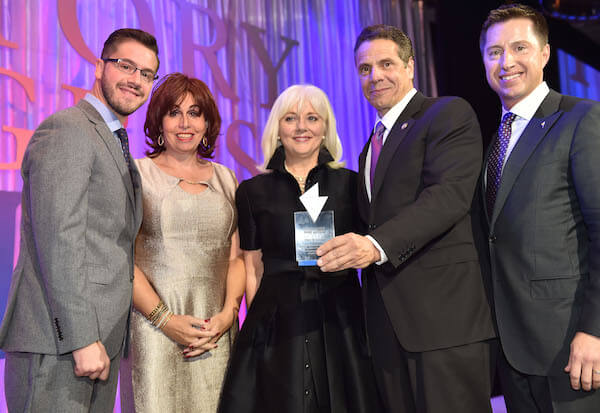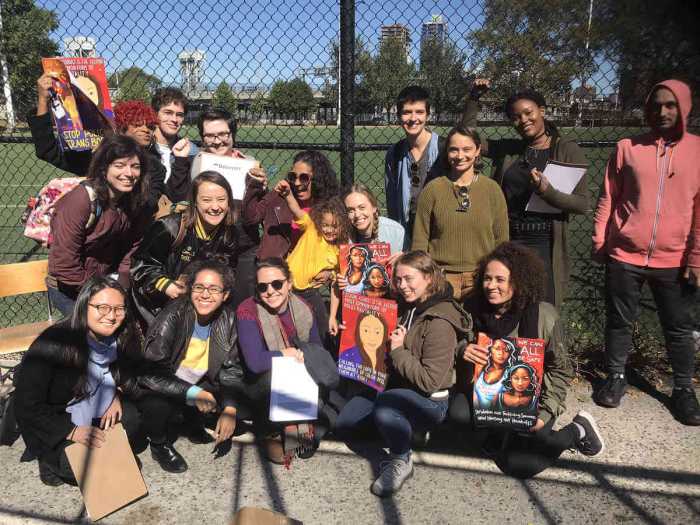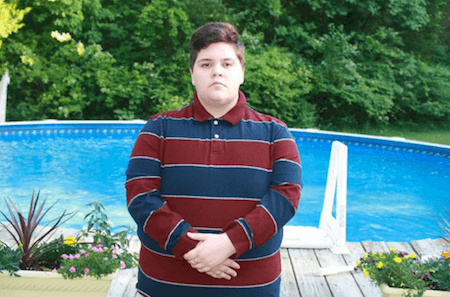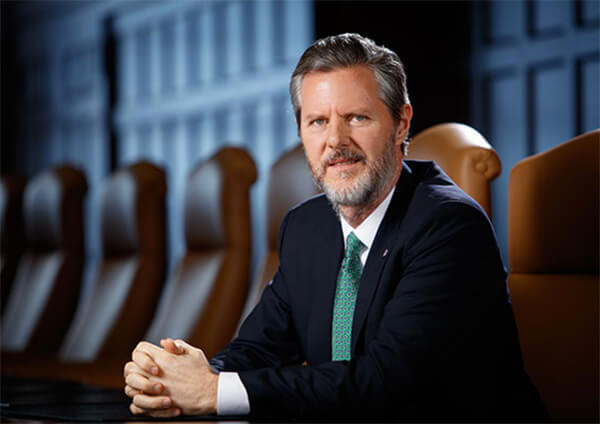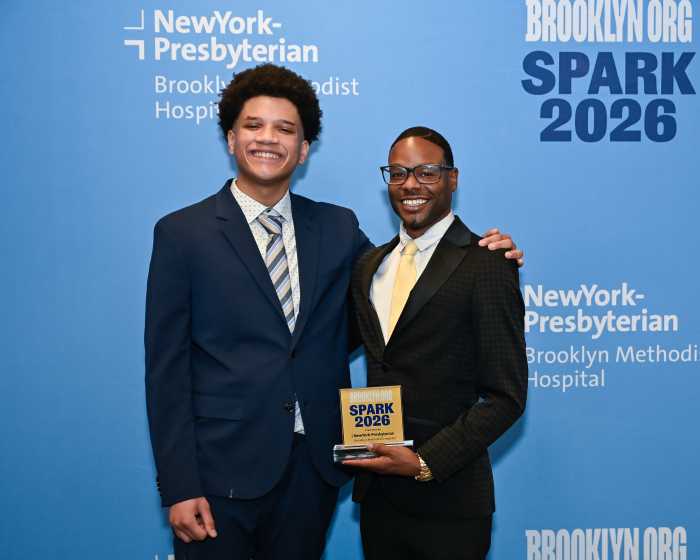Citing its success in winning new state regulations protecting transgender New Yorkers from discrimination, the Empire State Pride Agenda has announced it will close down major operations in early 2016.
In a press release issued on the evening of December 12, the organization indicated that it hoped to maintain a political action committee “to play a continuing role in electoral politics,” while identifying “aspects of its policy work to transition to partner LGBT organizations.”
The release, explaining the decision was reached unanimously by the group’s two component boards of directors, stated, “The Boards’ decision comes on the heels of securing the Pride Agenda’s top remaining policy priority –– protecting transgender New Yorkers from discrimination in housing, employment, credit, education, and public accommodations –– in the form of new regulations announced in partnership with Governor Andrew M. Cuomo at the organization’s Fall Dinner on October 22, 2015.”
The press statement made no mention of the Gender Expression Non-Discrimination Act (GENDA), a transgender civil rights bill that ESPA, advocates, and legislative allies worked on unsuccessfully for nearly 13 years prior to the Cuomo regulations. In an accompanying Q&A provided to reporters, the group stated, “GENDA remains a priority for many LGBT New Yorkers and some partner LGBT organizations may continue to advocate for its passage. But given the Governor’s recent action, the Pride Agenda believes it has achieved its top policy goal of protecting transgender New Yorkers from discrimination.”
That statement, signaling ESPA’s conclusion that the bill was no longer essential, will likely prove controversial –– even divisive –– to other advocates and Albany legislators who, while praising Cuomo’s action, argued that enacting GENDA remained a priority.
The governor’s regulations, which were published on November 4 and then subject to a 45-day public comment period before taking effect, define discrimination on the basis of gender identity or expression as sex discrimination long outlawed by New York statute. They also spell out that discrimination based on “gender dysphoria” –– defined medically as having a gender identity different from the sex assigned at birth –– is discrimination based on disability, also a protected class under New York Human Rights law.
When the Cuomo announcement was made, Mara Keisling, the executive director of the National Center for Transgender Equality (NCTE), praised the governor but also said, “Passing GENDA is still necessary and urgent, because employers and businesses must be aware of the law.”
NCTE officials were not immediately available to comment on the statement and action by the Pride Agenda.
Dick Gottfried, a Chelsea Democrat who as the lead GENDA sponsor succeeded in winning repeated passage of the measure in the State Assembly, reacted to the Cuomo regulations by noting they do not extend protections under the state hate crimes law –– a criminal not human rights statute –– to the transgender community, and said, “District attorneys should apply this interpretation to apply New York’s hate crimes law to anti-transgender violence.” But he added, “The State Senate is not off the hook. They should still pass my GENDA bill so this protection cannot be removed by a future governor’s interpretation.”
Daniel Squadron, a Lower Manhattan Democrat who is GENDA’s lead sponsor in the Senate, praised the governor’s October action but also noted the importance of enacting the protections legislatively.
“This appears to be quite significant and difficult to undo,” he told Gay City News when Cuomo made his announcement. “I am a legislator and would prefer to always do it through legislation, and doing so that way sends a strong message to the community.”
Contacted shortly before ESPA made its announcement official, Senator Brad Hoylman, an out gay West Side Democrat, said he was “certainly not” giving up on the effort to enact GENDA. He also noted that two other significant pieces of LGBT-related legislation, on which he is the lead sponsor –– a bill barring so-called “reparative” or “conversion” therapy on LGBT minors and the Child Parent Security Act, which would end New York State’s ban on gestational surrogacy –– have, like GENDA, been denied a floor vote in the Republican-led Senate.
“I think there must be other forces at work here that are internal or financial,” said Hoylman, who only heard of ESPA’s plans hours before the group’s announcement. “On its face, you can’t declare a mission accomplished on LGBT rights. We have not gotten Senate consideration of an LGBT-related bill in almost five years. That is a serious dereliction of the Senate’s duty.”
The Q&A that ESPA provided to reporters acknowledged that fundraising in a post-marriage equality world is more difficult for LGBT organizations but denied that financial woes were at the heart of its decision.
“The Pride Agenda, like many other nonprofit organizations, appreciates that fundraising challenges naturally coincide with mission victories,” the group stated. “Nonetheless, this choice is mission-driven rather than being about whether or not the Pride Agenda can remain fiscally solvent.”
Longtime transgender advocate Jillian Weiss, an attorney who teaches at Ramapo College, argued that mission and finances cannot easily be divorced as factors in the Pride Agenda’s demise.
“I think there's going to be a post-marriage shake-out that will shutter many organizations,” she in an email. “ESPA acknowledged that ‘fundraising challenges naturally coincide with mission victories,’ and I think that's true of more organizations than ESPA. Those that cannot create a vision for the new challenges that remain for trans people, for LGBT people of color and LGBT youth, will rightly say, ‘mission accomplished.’ Organizations have a population cycle, just as people do, and there is a new group of smaller organizations coming up to address these important issues. It will our job as a community to support them, just as we did 25 years ago when ESPA was formed to serve important needs for the gay community of that time. It’s not over.”
Hoylman clearly does not share ESPA’s “mission-driven” conclusion.
“I’m hopeful that another organization will step in and fill the void here and do the important work they’ve done for 25 years,” he said. “It’s very, very important to have a group to engage the wider public. The Senate minority is starved of resources to promote an LGBT agenda statewide.”
Hoylman also suggested that what he called the Pride Agenda’s “supposed bipartisanship” contributed to its undoing.
“Maybe we need a more aggressive organization that calls the Republicans out as a party,” he said. “The whole formula for advancing human rights by working across the aisle just doesn't cut it anymore. To raise money, a group needs to show a sharper focus on what’s needed to reach those goals.”
A successor group to the Pride Agenda, Hoylman said, would have to show itself adept at online organizing and social media in order to galvanize the support to sustain itself and work in what he termed an ever more “politically polarized” environment in New York and elsewhere.
One of the strongest criticisms of ESPA's action came from Matt Foreman, who served as the group's executive director for two stints between 1998 and 2003 and led the group to win passage of both the state's hate crimes law and its gay rights law. In an email message, he called the group's release “appalling” and said, “The job isn't half done.” On Facebook, Foreman, who now heads up philanthropic giving in LGBT and immigrant rights for the Evelyn & Walter Haas, Jr. Fund, termed the group's move “beyond shocking.”
“We are dealing with a political system and you need a political organization,” Foreman later told Gay City News by phone. “Albany doesn't just respond to good ideas.” What was most disconcerting in his view was that “there was zero consultation with folks who spent their lives building the Pride Agenda. If they are going to make a decision of that magnitude, there has to be a consultative function. They need to talk to the stakeholders, to the communities around the state.”
Foreman, who now lives in California, noted that the Legislature there has passed law after law regarding LGBT lives –– that state's ban on practicing conversion therapy on minors just one of many –– “baking in equality.” Equality California, he said, has tackled questions of “lived equality” and been successful in doing what he called “cross-movement,” or coalition, work on issues from immigrant rights to health. In contrast, New York, he argued, continues to have a statutory framework that is “dismissive and silent on needs” in the LGBT community.
The Pride Agenda's decision, Foreman said, “is an abrogation of a fundamental obligation that an organization has to its constituency… And, it plays into the national narrative that the job is done, and people look to New York.”
He added, “Millions of dollars were spent on building up this brand, and now they are just throwing it away.”
Alan Van Capelle, who led ESPA from 2003 until early 2010 and is now CEO of the Educational Alliance, agreed with Hoylman’s assessment that an organization will have to emerge to succeed the Pride Agenda.
“There needs to be a statewide organization that is able to hold elected officials feet to the fire,” he said. “Does it need to look exactly like the Pride Agenda? Not necessarily… I think it’s critically important that LGBT New Yorkers remain politically active as LGBT New Yorkers. Our community remains woefully underfunded on our health needs and for the most vulnerable among us, both in municipalities and in state government.”
Van Capelle called for community dialogue about what steps are needed next, and alluded to the crisis that AIDS 35 years ago posed to a community with little organizational infrastructure.
“As a community we need to have a statewide conversation about how we remain engaged and powerful,” he said. “I don't want it to take us a decade to reinvent the wheel when the next crisis comes up.”
Stuart Appelbaum, a Pride Agenda board member, offered his view of how the community should move forward post-ESPA.
“Any new organization must better tap leadership and represent diversity in the LGBT movement,” he said. “The organization should avoid becoming too reliant on fundraising to sustain a corporate model, rather than a movement model.”
In Appelbaum’s view, the next step would not be –– as Hoylman seemed to suggest –– the birth of a new organization to replace ESPA, but rather the development of a convening model, in which existing LGBT groups statewide could be marshaled to consider major issues and challenges and put forward a clear public perspective on behalf of the community.
One leading trans advocate, Joann Prinzivalli, who has headed up the New York Transgender Rights Organization, suggested that she and her fellow activists have long understood they would need to take the lead on GENDA and other initiatives of key concern to the transgender community.
“I can understand Pride Agenda scaling down,” she wrote in an email message. “Passing GENDA is not going to be easy with the gerrymandered and upstate-packed State Senate. The executive order works for now and if we can get some court cases backing it up, it would be difficult to reverse. Pride Agenda's donor base is not from the trans community, so I can understand the decision. The trans community is in this for the long haul and we are going to have to ramp up our own efforts.”
Prinzivalli said a new group focused on transgender issues was already being put together.
The Pride Agenda's board leaders and its executive director, Nathan Schaefer, said they would make themselves available for comment on December 13.

